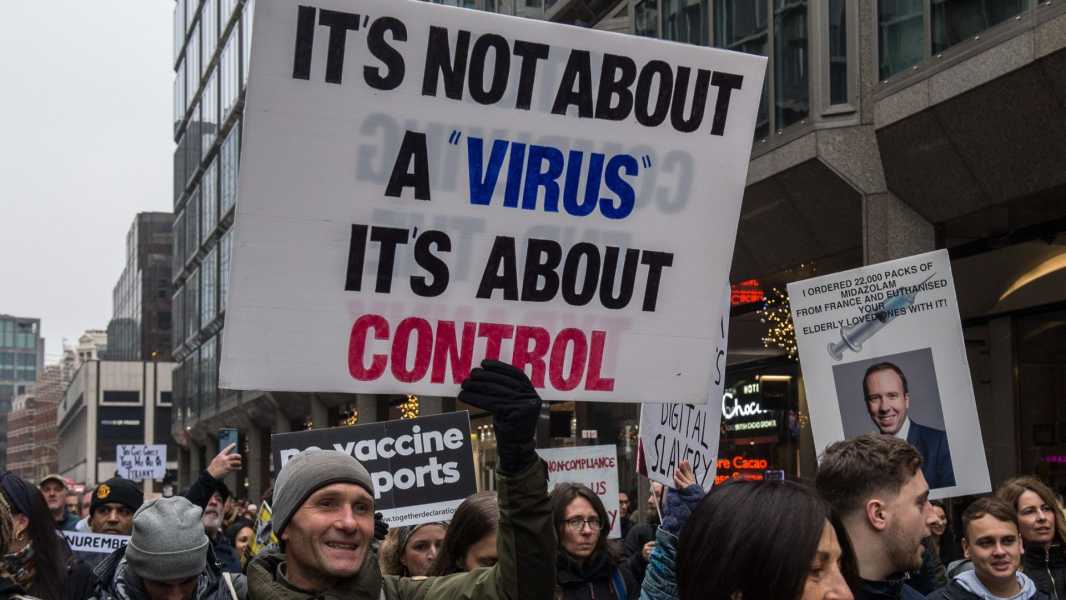
Interest in conspiracy theories has increased significantly during the COVID-19 pandemic. (Image credit: Guy Smallman/Author via Getty Images)
Debunking conspiracy theories with counter-arguments often proves ineffective, but a new scientific review suggests there may be alternative approaches that can effectively counter conspiracy theories.
Interest in conspiracy theories, already on the rise over the past decade, has exploded during the pandemic, with non-compliance with public health recommendations sometimes linked to conspiracy beliefs. For example, anti-vaccinationists may refuse to vaccinate themselves or their children, arguing that some dangerous consequences of vaccination are being hidden from the public. Although conspiracy theories have become increasingly prominent in public discourse, they have proven difficult to change.
“I wouldn’t have done my PhD on this project if it was easy to counter conspiracy theories,” said Sian O’Mahony, a psychology PhD student at University College Cork in Ireland, who led the systematic review published in the journal PLOS One. The review doesn’t offer a “magic solution” to combat conspiracy theories, he said, but “we’ve found some interesting avenues for future research that should be pursued.”
The review is the first of its kind, as previous studies have focused largely on understanding the psychological underpinnings of conspiracy beliefs, O'Mahony told Live Science. Research aimed at developing interventions to combat conspiracy theories is still relatively new. “When we did the review, we found that there were only a handful of papers that had actually been published on the topic,” he added.
O'Mahony described a conspiracy theory as “a belief that explains events by referring to malevolent groups operating in secret.” The presence of some kind of underground organization distinguishes conspiracy theories from general disinformation and “fake news.” For example, the statement “Bigfoot exists” would not be considered a conspiracy theory unless it was qualified by “and some organization is trying to cover it up.”
A new review suggests that many methods for changing conspiracy beliefs are ineffective – particularly those that involve directly challenging a person’s beliefs once they have been reinforced. However, the review also highlights some new approaches that may be successful in combating conspiracy theories.
The most promising approach was training people to analyze information critically, so they could distinguish between pseudoscience and truth. However, even generally “analytically primed” study participants to be more attentive—for example, by presenting them with text in a hard-to-read font—was able to reduce the likelihood of falling for the conspiracy theory they soon encountered.
Finally, “information inoculation” can also be effective. In this strategy, counterarguments to a conspiracy theory are presented along with a warning that exposure to the disinformation must precede exposure to the theory itself. This is similar to how a vaccine injects a person with a fragment or weakened form of a virus so that they become resistant to the disease when they encounter it.
(Unfortunately, the same approach can be used to spread a conspiracy theory if someone first “plants” an explanation for it with a conspiracy theory, O'Mahony noted.)
“While the review is not overly optimistic, it does point to several potentially promising avenues for research,” University of Belgrade social psychology professor Iris Žeželj, who was not involved in the new review, wrote in an email.
She also highlighted the need for replication studies to demonstrate the success of interventions, as well as the challenges of integrating them into policy. O'Mahony noted the same caveats, and also pointed out the current lack of evidence that any of these interventions have a long-term effect.
Valerie van Mulukom, a research fellow at the Centre for Trust, Peace and Social Relations at Coventry University in the UK, who was not involved in the review,
Sourse: www.livescience.com





